My
List |
Addition Date
|
Target
|
Mission
|
Instrument
|
Size
|

|
2024-10-11 |
Europa
|
Galileo
|
Near Infrared Mapping Spectrometer
|
1062x1062x3 |
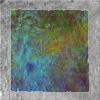
|
-
PIA26104:
-
Map of Water Signatures at Europa's Manannán Crater
Full Resolution:
TIFF
(3.385 MB)
JPEG
(289.1 kB)
|

|
2024-10-02 |
Europa
|
Galileo
|
Solid-State Imaging
|
1024x425x3 |
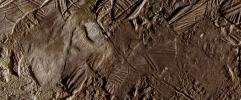
|
-
PIA26446:
-
Conamara Color Closeup
Full Resolution:
TIFF
(1.306 MB)
JPEG
(112.2 kB)
|

|
2023-04-14 |
Europa
|
Galileo
|
Solid-State Imaging
|
360x360x1 |
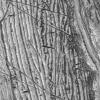
|
-
PIA25499:
-
Europa's Surface: Up-Close Topography
Full Resolution:
TIFF
(130 kB)
JPEG
(35.73 kB)
|

|
2023-04-14 |
Europa
|
Galileo
|
Solid-State Imaging
|
400x400x1 |
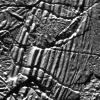
|
-
PIA25498:
-
Europa Close-Up
Full Resolution:
TIFF
(160.4 kB)
JPEG
(40.6 kB)
|

|
2021-11-30 |
Europa
|
Galileo
Voyager
|
|
1100x600x3 |
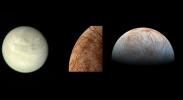
|
-
PIA24895:
-
Three Views of Europa
Full Resolution:
TIFF
(679.4 kB)
JPEG
(39.56 kB)
|

|
2020-05-01 |
Europa
|
Galileo
|
Imaging Science Subsystem
|
1265x1265x3 |
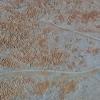
|
-
PIA23873:
-
Chaos Near Agenor Linea
Full Resolution:
TIFF
(4.803 MB)
JPEG
(462.1 kB)
|

|
2020-05-01 |
Europa
|
Galileo
|
Imaging Science Subsystem
|
1275x1282x3 |

|
-
PIA23872:
-
Crisscrossing Bands
Full Resolution:
TIFF
(4.906 MB)
JPEG
(490 kB)
|

|
2020-05-01 |
Europa
|
Galileo
|
Imaging Science Subsystem
|
1306x1301x3 |
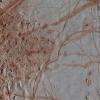
|
-
PIA23871:
-
Chaos Transition
Full Resolution:
TIFF
(5.099 MB)
JPEG
(471.7 kB)
|

|
2019-04-11 |
Europa
|
Galileo
|
Solid-State Imaging
|
1557x1093x3 |
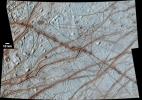
|
-
PIA23166:
-
Europa's Rhadamanthys Linea
Full Resolution:
TIFF
(5.071 MB)
JPEG
(380.3 kB)
|

|
2017-04-13 |
Europa
|
Galileo
|
|
2380x1438x3 |
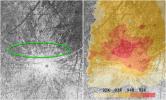
|
-
PIA21444:
-
Europa's Plumes Located near 'Warm Spot' on Europa
Full Resolution:
TIFF
(6.722 MB)
JPEG
(676.7 kB)
|

|
2017-04-13 |
Europa
|
Galileo
Hubble Space Telescope
|
|
1235x618x3 |
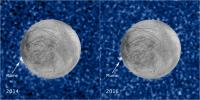
|
-
PIA21443:
-
Hubble Sees Recurring Plume Erupting From Europa
Full Resolution:
TIFF
(1.277 MB)
JPEG
(118.6 kB)
|

|
2017-02-08 |
Europa
|
Galileo
|
Solid-State Imaging
|
1338x2619x1 |

|
-
PIA21431:
-
Highest-resolution Europa Image & Mosaic from Galileo
Full Resolution:
TIFF
(1.724 MB)
JPEG
(350 kB)
|

|
2016-05-17 |
Europa
|
Galileo
|
Solid-State Imaging
|
1252x2448x3 |

|
-
PIA20028:
-
Europa's Varied Surface Features
Full Resolution:
TIFF
(9.198 MB)
JPEG
(825 kB)
|

|
2015-09-15 |
Jupiter
|
Galileo
Voyager
|
|
1700x956x3 |
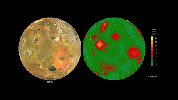
|
-
PIA19655:
-
Map of Io's Volcanic Heat Flow

Full Resolution:
TIFF
(1.71 MB)
JPEG
(100.1 kB)
|

|
2014-11-21 |
Europa
|
Galileo
|
|
2300x1700x3 |
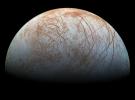
|
-
PIA19048:
-
Europa's Stunning Surface
Full Resolution:
TIFF
(11.73 MB)
JPEG
(363.4 kB)
|

|
2014-09-08 |
Europa
|
Galileo
|
|
4519x2810x3 |
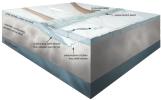
|
-
PIA18428:
-
Plate Tectonics on Europa
Full Resolution:
TIFF
(38.12 MB)
JPEG
(557.7 kB)
|

|
2014-07-08 |
Europa
|
Galileo
|
Solid-State Imaging
|
766x750x3 |
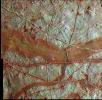
|
-
PIA18413:
-
Reddish Bands on Europa
Full Resolution:
TIFF
(1.724 MB)
JPEG
(200.8 kB)
|

|
2014-02-26 |
Europa
|
Galileo
Voyager
|
|
2161x2161x1 |
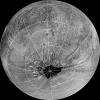
|
-
PIA18030:
-
Source Region for Possible Europa Plumes
Full Resolution:
TIFF
(4.676 MB)
JPEG
(987.7 kB)
|

|
2014-02-12 |
Ganymede
|
Galileo
Voyager
|
|
797x754x3 |
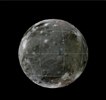
|
-
PIA17902:
-
Rotating Globe of Ganymede Geology

Full Resolution:
TIFF
(1.804 MB)
JPEG
(39.54 kB)
|

|
2014-02-12 |
Ganymede
|
Galileo
Voyager
|
|
1800x956x3 |
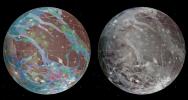
|
-
PIA17901:
-
Ganymede Global Geologic Map and Global Image Mosaic
Full Resolution:
TIFF
(5.165 MB)
JPEG
(213.7 kB)
|

|
2014-01-08 |
Europa
|
Galileo
|
|
1337x715x1 |
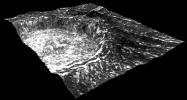
|
-
PIA17851:
-
3-D Cilix Crater on Europa
Full Resolution:
TIFF
(957.1 kB)
JPEG
(132 kB)
|

|
2013-12-12 |
Europa
|
Galileo
Hubble Space Telescope
Voyager
|
|
1045x1045x3 |
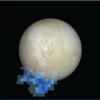
|
-
PIA17660:
-
Water Vapor Over Europa
Full Resolution:
TIFF
(3.278 MB)
JPEG
(64.1 kB)
|

|
2013-12-11 |
Europa
|
Galileo
|
Near Infra-Red Mapping Spectrometer
|
1601x800x3 |
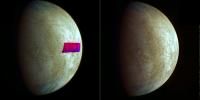
|
-
PIA17658:
-
Clay Prints on Europa
Full Resolution:
TIFF
(3.844 MB)
JPEG
(97.92 kB)
|

|
2013-12-11 |
Europa
|
Galileo
|
|
2208x2292x3 |

|
-
PIA17657:
-
Hit Hard: Possible Collision at Europa (Artist's Concept)
Full Resolution:
TIFF
(15.19 MB)
JPEG
(338.3 kB)
|

|
2013-11-25 |
Europa
|
Galileo
|
Solid-State Imaging
|
603x433x3 |
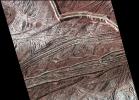
|
-
PIA17737:
-
Cracks and Ridges on Europa
Full Resolution:
TIFF
(783.8 kB)
JPEG
(64.1 kB)
|

|
2013-04-12 |
Europa
|
Galileo
|
Near Infrared Mapping Spectrometer
|
3000x1401x3 |
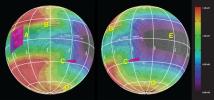
|
-
PIA16921:
-
Energy From Above Affecting Surface of Europa
Full Resolution:
TIFF
(12.61 MB)
JPEG
(479.9 kB)
|

|
2013-03-05 |
Europa
|
Galileo
|
Solid-State Imaging
|
4200x5814x3 |

|
-
PIA16827:
-
Repeated Flybys Yield a Pole-to-Pole View of Europa
Full Resolution:
TIFF
(73.3 MB)
JPEG
(2.891 MB)
|

|
2011-05-12 |
Io
|
Galileo
|
|
1668x1648x3 |
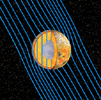
|
-
PIA14116:
-
Io's "Sounding Signal"

Full Resolution:
TIFF
(8.26 MB)
JPEG
(320.2 kB)
|

|
2011-03-31 |
Jupiter
|
Galileo
|
|
2610x4104x3 |

|
-
PIA13894:
-
Comet Impact Into Jupiter (Artist's Concept)
Full Resolution:
TIFF
(32.17 MB)
JPEG
(1.308 MB)
|

|
2011-03-31 |
J Rings
|
Galileo
|
Solid-State Imaging
|
715x781x1 |

|
-
PIA13893:
-
Subtle Ripples in Jupiter's Ring
Full Resolution:
TIFF
(559.2 kB)
JPEG
(66.54 kB)
|

|
2007-04-02 |
Io
|
Galileo
Voyager
|
Solid-State Imaging
|
11445x3643x3 |

|
-
PIA09257:
-
Io in Motion

Full Resolution:
TIFF
(125.1 MB)
JPEG
(3.431 MB)
|

|
2005-05-31 |
Amalthea
|
Galileo
Voyager
|
Solid-State Imaging
|
1800x541x3 |

|
-
PIA07248:
-
Amalthea, A Rubble-Pile Moon
Full Resolution:
TIFF
(2.926 MB)
JPEG
(42.38 kB)
|

|
2004-08-13 |
Ganymede
|
Galileo
|
Solid-State Imaging
|
720x540x3 |
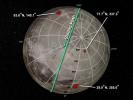
|
-
PIA05077:
-
Lumps Within Ganymede
Full Resolution:
TIFF
(703.9 kB)
JPEG
(61.89 kB)
|

|
2002-12-06 |
Io
|
Galileo
|
Solid-State Imaging
|
720x431x3 |
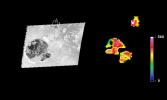
|
-
PIA03888:
-
Io's Gish Bar Volcanic Region in Infrared
Full Resolution:
TIFF
(140.8 kB)
JPEG
(24.83 kB)
|

|
2002-12-06 |
Io
|
Galileo
|
Solid-State Imaging
|
798x561x1 |
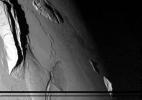
|
-
PIA03886:
-
Mountains on Io at Sunset
Full Resolution:
TIFF
(399.8 kB)
JPEG
(51.89 kB)
|

|
2002-12-06 |
Io
|
Galileo
|
Solid-State Imaging
|
4200x3200x3 |
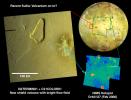
|
-
PIA03887:
-
Potential Source of Sulfur Flow on Io
Full Resolution:
TIFF
(22.3 MB)
JPEG
(947.9 kB)
|

|
2002-12-06 |
Io
|
Galileo
|
Solid-State Imaging
|
1907x2955x3 |

|
-
PIA03885:
-
Io's Culann-Tohil Region in Color
Full Resolution:
TIFF
(14.78 MB)
JPEG
(594.4 kB)
|

|
2002-12-06 |
Io
|
Galileo
|
Solid-State Imaging
|
1262x1043x1 |
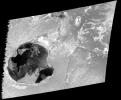
|
-
PIA03884:
-
Recent Eruption at Gish Bar Patera on Io
Full Resolution:
TIFF
(985.7 kB)
JPEG
(145.8 kB)
|

|
2002-10-30 |
Europa
|
Galileo
|
Solid-State Imaging
|
849x660x3 |
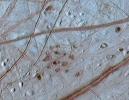
|
-
PIA03878:
-
Ruddy "Freckles" on Europa
Full Resolution:
TIFF
(1.683 MB)
JPEG
(132 kB)
|

|
2002-10-17 |
Callisto
|
Galileo
Voyager
|
VG Imaging Science Subsystem
Solid-State Imaging
|
8860x4490x3 |
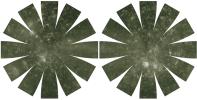
|
-
PIA03876:
-
Callisto Hemispherical Globes
Full Resolution:
TIFF
(49.38 MB)
JPEG
(3.662 MB)
|

|
2002-10-08 |
Jupiter
|
Galileo
Hubble Space Telescope
IRTF
|
WFPC2
|
650x300x3 |
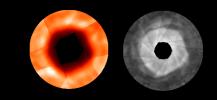
|
-
PIA03864:
-
Cold Hole Over Jupiter's Pole
Full Resolution:
TIFF
(176.2 kB)
JPEG
(15.88 kB)
|

|
2002-05-28 |
Io
|
Galileo
|
Near Infrared Mapping Spectrometer
|
974x509x3 |
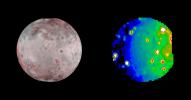
|
-
PIA03535:
-
Io in Infrared, Night and Day
Full Resolution:
TIFF
(312.2 kB)
JPEG
(36.39 kB)
|

|
2002-05-28 |
Io
|
Galileo
|
Near Infrared Mapping Spectrometer
|
816x600x3 |
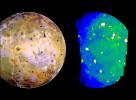
|
-
PIA03534:
-
Io in Infrared with Giant Plume's New Hot Spot
Full Resolution:
TIFF
(623.6 kB)
JPEG
(59.13 kB)
|

|
2002-05-28 |
Io
|
Galileo
|
Near Infrared Mapping Spectrometer
|
720x480x3 |
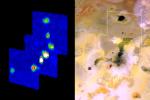
|
-
PIA03533:
-
Amirani Lava Flow on Io
Full Resolution:
TIFF
(606.9 kB)
JPEG
(34.96 kB)
|

|
2002-05-28 |
Io
|
Galileo
|
Solid-State Imaging
|
1122x842x1 |
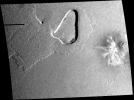
|
-
PIA03532:
-
Volcanic Depression and Shield Volcano, Io
Full Resolution:
TIFF
(885.6 kB)
JPEG
(142.7 kB)
|

|
2002-05-28 |
Io
|
Galileo
|
Solid-State Imaging
|
1280x929x1 |
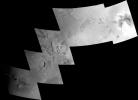
|
-
PIA03531:
-
New plume vent near Zamama, Io
Full Resolution:
TIFF
(197.7 kB)
JPEG
(71.94 kB)
|

|
2002-05-28 |
Io
|
Galileo
|
Solid-State Imaging
|
800x800x1 |
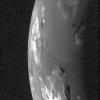
|
-
PIA03530:
-
Galileo's Best View of Loki Volcano on Io
Full Resolution:
TIFF
(477.5 kB)
JPEG
(89.71 kB)
|

|
2002-05-28 |
Io
|
Galileo
|
Solid-State Imaging
|
1280x866x1 |
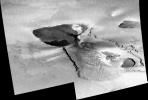
|
-
PIA03529:
-
Galileo's Last View of Tvashtar, Io
Full Resolution:
TIFF
(381.9 kB)
JPEG
(149.2 kB)
|

|
2002-05-28 |
Io
|
Galileo
|
Solid-State Imaging
|
1280x963x1 |
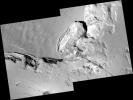
|
-
PIA03528:
-
Collapsing Cliff at Telegonus Mensa, Io
Full Resolution:
TIFF
(301.6 kB)
JPEG
(105 kB)
|

|
2002-05-28 |
Io
|
Galileo
|
Solid-State Imaging
|
1174x1024x1 |
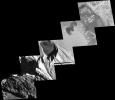
|
-
PIA03527:
-
Detailed View of Mountain and Craters at Tohil, Io
Full Resolution:
TIFF
(227.7 kB)
JPEG
(98.12 kB)
|

|
2002-05-10 |
Ganymede
|
Galileo
Voyager
|
VG Imaging Science Subsystem
VG Imaging Science Subsystem - Narrow Angle
|
8817x4382x3 |
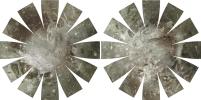
|
-
PIA03781:
-
Global Map of Ganymede
Full Resolution:
TIFF
(79.65 MB)
JPEG
(4.501 MB)
|

|
2002-02-16 |
Europa
|
Galileo
Voyager
|
|
8812x4381x3 |
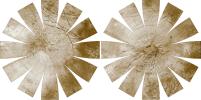
|
-
PIA03526:
-
Europa Hemispherical Globes
Full Resolution:
TIFF
(24.1 MB)
JPEG
(6.048 MB)
|

|
2001-12-10 |
Io
|
Galileo
|
Solid-State Imaging
|
5065x3361x1 |
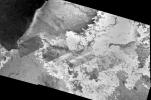
|
-
PIA02598:
-
Lava Channel at Io's Emakong Patera
Full Resolution:
TIFF
(12.18 MB)
JPEG
(1.129 MB)
|

|
2001-12-10 |
Io
|
Galileo
|
Solid-State Imaging
|
954x1035x1 |

|
-
PIA03600:
-
Tall Mountain, Tohil Mons, on Io
Full Resolution:
TIFF
(687.7 kB)
JPEG
(120.4 kB)
|

|
2001-12-10 |
Io
|
Galileo
|
Near Infrared Mapping Spectrometer
|
740x340x3 |
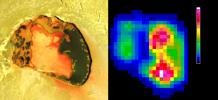
|
-
PIA03601:
-
Io's Tupan Caldera in Infrared
Full Resolution:
TIFF
(501.9 kB)
JPEG
(36.29 kB)
|

|
2001-12-10 |
Io
|
Galileo
|
Photopolarimeter-Radiometer
|
1655x1339x3 |
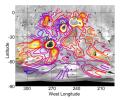
|
-
PIA03603:
-
Nighttime Temperatures on Southern Io
Full Resolution:
TIFF
(2.642 MB)
JPEG
(344.3 kB)
|

|
2001-12-10 |
Io
|
Galileo
|
Near Infrared Mapping Spectrometer
|
540x360x3 |
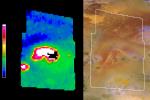
|
-
PIA03602:
-
A New Hot Spot on Northern Io
Full Resolution:
TIFF
(301.3 kB)
JPEG
(25.83 kB)
|

|
2001-12-10 |
Io
|
Galileo
|
Solid-State Imaging
|
736x680x3 |
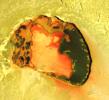
|
-
PIA02599:
-
Colorful Tupan Patera, Io
Full Resolution:
TIFF
(1.55 MB)
JPEG
(68.25 kB)
|

|
2001-11-29 |
Callisto
|
Galileo
|
Solid-State Imaging
|
1280x774x1 |
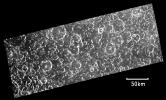
|
-
PIA02593:
-
Opposite Side of Callisto from Valhalla Impact
Full Resolution:
TIFF
(609.1 kB)
JPEG
(121.2 kB)
|

|
2001-11-27 |
Io
|
Galileo
|
Solid-State Imaging
|
798x401x1 |
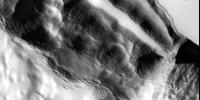
|
-
PIA02597:
-
Slumping Cliff on Io in High Resolution
Full Resolution:
TIFF
(309.9 kB)
JPEG
(41.94 kB)
|

|
2001-11-27 |
Io
|
Galileo
|
Solid-State Imaging
|
800x623x3 |
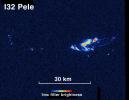
|
-
PIA02596:
-
Io's Pele Glowing in the Dark
Full Resolution:
TIFF
(471.9 kB)
JPEG
(98.62 kB)
|

|
2001-11-27 |
Io
|
Galileo
|
Near Infrared Mapping Spectrometer
|
595x415x3 |
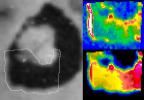
|
-
PIA02595:
-
Io's Loki in Infrared: Hot Edge
Full Resolution:
TIFF
(94.45 kB)
JPEG
(34.11 kB)
|

|
2001-11-27 |
Io
|
Galileo
|
Near Infrared Mapping Spectrometer
|
468x620x3 |

|
-
PIA02594:
-
Io's Tvashtar Area in Infrared: Multiple Lava Flows
Full Resolution:
TIFF
(441.1 kB)
JPEG
(31.68 kB)
|

|
2001-10-04 |
Io
|
Galileo
|
Solid-State Imaging
|
690x254x3 |
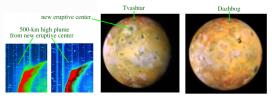
|
-
PIA02592:
-
Northern Plume and Plume Deposits on Io
Full Resolution:
TIFF
(297.1 kB)
JPEG
(27.59 kB)
|

|
2001-10-04 |
Io
|
Galileo
|
Near Infrared Mapping Spectrometer
|
1152x576x3 |
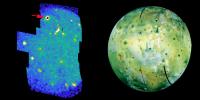
|
-
PIA02591:
-
Hot Spots on Io
Full Resolution:
TIFF
(806.2 kB)
JPEG
(73.93 kB)
|

|
2001-08-22 |
Callisto
|
Galileo
|
Solid-State Imaging
|
740x753x3 |

|
-
PIA03456:
-
Global Callisto in Color
Full Resolution:
TIFF
(1.219 MB)
JPEG
(73.69 kB)
|

|
2001-08-22 |
Callisto
|
Galileo
|
Solid-State Imaging
|
2000x1510x1 |
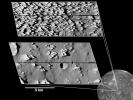
|
-
PIA03455:
-
Callisto Close-up with Jagged Hills
Full Resolution:
TIFF
(1.625 MB)
JPEG
(311.7 kB)
|

|
2001-06-22 |
Europa
|
Galileo
|
Solid-State Imaging
|
536x900x3 |

|
-
PIA02590:
-
Europa's Frozen Surface
Full Resolution:
TIFF
(1.322 MB)
JPEG
(111.1 kB)
|

|
2001-06-22 |
Io
|
Galileo
|
Photopolarimeter-Radiometer
|
1157x574x3 |
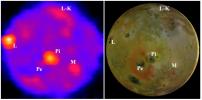
|
-
PIA02589:
-
Io's Nighttime Heat
Full Resolution:
TIFF
(1.384 MB)
JPEG
(51.07 kB)
|

|
2001-03-29 |
Io
|
Cassini-Huygens
Galileo
|
Solid-State Imaging
|
1100x900x3 |
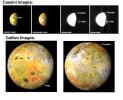
|
-
PIA02588:
-
Galileo and Cassini Image Two Giant Plumes on Io
Full Resolution:
TIFF
(1.374 MB)
JPEG
(96.56 kB)
|

|
2001-03-13 |
Ganymede
|
Galileo
|
Solid-State Imaging
|
1089x842x1 |
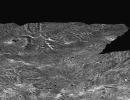
|
-
PIA03218:
-
Ganymede Topography
Full Resolution:
TIFF
(586.4 kB)
JPEG
(182.9 kB)
|

|
2001-03-13 |
Ganymede
|
Galileo
|
Solid-State Imaging
|
542x425x1 |
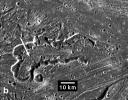
|
-
PIA03217:
-
Caldera in Sippar Sulcus, Ganymede
Full Resolution:
TIFF
(245.7 kB)
JPEG
(57.36 kB)
|

|
2001-03-13 |
Ganymede
|
Galileo
|
Solid-State Imaging
|
404x294x1 |
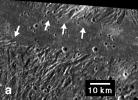
|
-
PIA03216:
-
Ridges and Troughs in Sippar Sulcus, Ganymede
Full Resolution:
TIFF
(96.07 kB)
JPEG
(28.92 kB)
|

|
2001-03-13 |
Ganymede
|
Galileo
|
Solid-State Imaging
|
328x450x3 |

|
-
PIA03215:
-
Erech Sulcus, Ganymede
Full Resolution:
TIFF
(141.7 kB)
JPEG
(35.15 kB)
|

|
2001-03-13 |
Ganymede
|
Galileo
|
Solid-State Imaging
|
1078x636x3 |
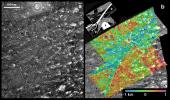
|
-
PIA03214:
-
Sippar Sulcus, Ganymede
Full Resolution:
TIFF
(1.332 MB)
JPEG
(255 kB)
|

|
2001-02-26 |
Io
|
Galileo
|
Solid-State Imaging
|
1270x660x3 |
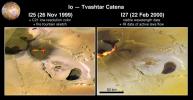
|
-
PIA02584:
-
Eruption at Tvashtar Catena on Io
Full Resolution:
TIFF
(1.901 MB)
JPEG
(114.5 kB)
|

|
2001-02-23 |
Io
|
Galileo
|
Solid-State Imaging
|
3347x2531x1 |
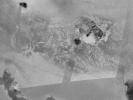
|
-
PIA02586:
-
Tohil Mons, Io
Full Resolution:
TIFF
(5.223 MB)
JPEG
(602.5 kB)
|

|
2001-02-23 |
Io
|
Galileo
|
Solid-State Imaging
|
4000x2500x3 |
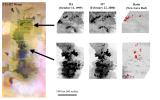
|
-
PIA02585:
-
Amirani's Big Lava Flow on Io
Full Resolution:
TIFF
(12.55 MB)
JPEG
(619.1 kB)
|

|
2000-12-17 |
Ganymede
|
Galileo
|
Solid-State Imaging
|
512x384x1 |
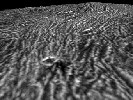
|
-
PIA02583:
-
Arbela Sulcus Flyover Movie

Full Resolution:
|

|
2000-12-16 |
Ganymede
|
Galileo
|
Solid-State Imaging
|
795x767x1 |
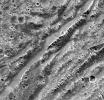
|
-
PIA02582:
-
Stair-step Scarps in Dark Terrain on Ganymede
Full Resolution:
TIFF
(615.6 kB)
JPEG
(143.8 kB)
|

|
2000-12-16 |
Ganymede
|
Galileo
|
Solid-State Imaging
|
3328x2330x1 |
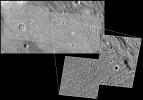
|
-
PIA02581:
-
Not-so-smooth Bright Terrain of Harpagia Sulcus
Full Resolution:
TIFF
(4.338 MB)
JPEG
(966.7 kB)
|

|
2000-12-16 |
Ganymede
|
Galileo
|
Solid-State Imaging
|
3777x2760x1 |
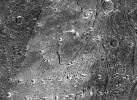
|
-
PIA02580:
-
Caldera-like depression on Ganymede
Full Resolution:
TIFF
(7.14 MB)
JPEG
(1.173 MB)
|

|
2000-12-16 |
Ganymede
|
Galileo
|
Solid-State Imaging
|
1358x1098x3 |
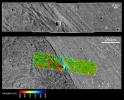
|
-
PIA02579:
-
Bright-dark boundary and topographical model
Full Resolution:
TIFF
(2.085 MB)
JPEG
(273.1 kB)
|

|
2000-12-16 |
Ganymede
|
Galileo
|
Solid-State Imaging
|
1228x512x3 |
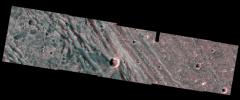
|
-
PIA02578:
-
Bright-Dark Terrain Boundary in stereo
Full Resolution:
TIFF
(1.147 MB)
JPEG
(90.2 kB)
|

|
2000-12-16 |
Ganymede
|
Galileo
|
Solid-State Imaging
|
1764x809x1 |
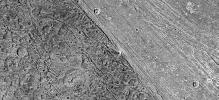
|
-
PIA02577:
-
Bright-Dark Terrain Boundary, Ganymede
Full Resolution:
TIFF
(1.508 MB)
JPEG
(364.7 kB)
|

|
2000-12-16 |
Ganymede
|
Galileo
|
Solid-State Imaging
|
1000x751x1 |
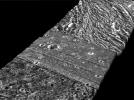
|
-
PIA02576:
-
Perspective view of Arbela Sulcus, Ganymede
Full Resolution:
TIFF
(561.9 kB)
JPEG
(118.7 kB)
|

|
2000-12-16 |
Ganymede
|
Galileo
|
Solid-State Imaging
|
2514x1929x1 |
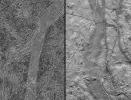
|
-
PIA02575:
-
Comparison of Ganymede and Europa features
Full Resolution:
TIFF
(5.617 MB)
JPEG
(1.04 MB)
|

|
2000-12-16 |
Ganymede
|
Galileo
|
Solid-State Imaging
|
1026x1748x1 |

|
-
PIA02574:
-
Ganymede Feature Resembling Europa
Full Resolution:
TIFF
(1.687 MB)
JPEG
(378.7 kB)
|

|
2000-12-16 |
Ganymede
|
Galileo
|
Solid-State Imaging
|
1249x1939x1 |

|
-
PIA02573:
-
Regional View of Bright and Dark Terrain
Full Resolution:
TIFF
(2.894 MB)
JPEG
(598.8 kB)
|

|
2000-12-16 |
Ganymede
|
Galileo
|
Solid-State Imaging
|
2603x756x1 |

|
-
PIA02572:
-
Region of Ganymede with Mix of Terrains
Full Resolution:
TIFF
(2.166 MB)
JPEG
(451.2 kB)
|

|
2000-12-16 |
Ganymede
|
Galileo
|
Solid-State Imaging
|
2000x2300x1 |

|
-
PIA02571:
-
Ganymede Dark Terrain at High Resolution
Full Resolution:
TIFF
(3.771 MB)
JPEG
(838.9 kB)
|

|
2000-10-26 |
Jupiter
|
Galileo
|
Near Infrared Mapping Spectrometer
|
2769x1542x3 |
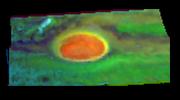
|
-
PIA02569:
-
Ammonia Ice near Jupiter's Great Red Spot
Full Resolution:
TIFF
(7.819 MB)
JPEG
(148.5 kB)
|

|
2000-10-26 |
Io
|
Galileo
|
Solid-State Imaging
|
1152x564x1 |
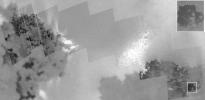
|
-
PIA02568:
-
Galileo Takes a Close-up Look at Prometheus
Full Resolution:
TIFF
(209.3 kB)
JPEG
(67.37 kB)
|

|
2000-10-26 |
Io
|
Galileo
|
Solid-State Imaging
|
413x900x3 |

|
-
PIA02567:
-
Giant Lava Flow on Io, in Color
Full Resolution:
TIFF
(1.187 MB)
JPEG
(44.4 kB)
|

|
2000-10-26 |
Io
|
Galileo
|
Solid-State Imaging
|
1152x483x3 |
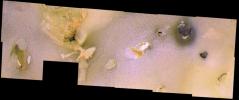
|
-
PIA02566:
-
Io's Chain of Craters
Full Resolution:
TIFF
(1.389 MB)
JPEG
(93.06 kB)
|

|
2000-10-26 |
Io
|
Galileo
|
Solid-State Imaging
|
889x766x3 |
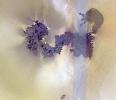
|
-
PIA02565:
-
Sources of Volcanic Plumes Near Prometheus
Full Resolution:
TIFF
(1.988 MB)
JPEG
(98.6 kB)
|

|
2000-10-26 |
Io
|
Galileo
|
Solid-State Imaging
|
900x750x3 |
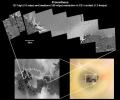
|
-
PIA02564:
-
Io's Prometheus Volcano at Various Resolutions
Full Resolution:
TIFF
(739.5 kB)
JPEG
(93.19 kB)
|

|
2000-10-26 |
Io
|
Galileo
|
Solid-State Imaging
|
782x752x1 |
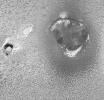
|
-
PIA02563:
-
Camaxtli Patera, An Active Volcanic Center on Io
Full Resolution:
TIFF
(638.4 kB)
JPEG
(169.6 kB)
|

|
2000-10-26 |
Io
|
Galileo
|
Solid-State Imaging
|
1152x899x1 |
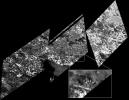
|
-
PIA02562:
-
Very High Resolution View of Io's Surface
Full Resolution:
TIFF
(292 kB)
JPEG
(137.4 kB)
|

|
2000-09-25 |
Europa
|
Galileo
|
Solid-State Imaging
|
4306x3306x3 |
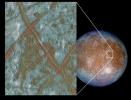
|
-
PIA03002:
-
Blocks in the Europan Crust Provide More Evidence of Subterranean Ocean
Full Resolution:
TIFF
(33.29 MB)
JPEG
(1.296 MB)
|

 Planetary Data System
Planetary Data System


















































































































